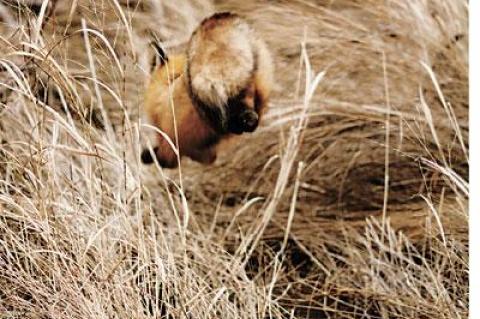Skunk cabbage, Symplocarpus foetidus, is a plant of the Northern Hemisphere and a species that occurs throughout most of North America except for in the South and West. A flowering plant in the Jack-in-the-pulpit family, it is one of the first plants to flower each year and thus is a true harbinger of spring. The second half of its scientific name refers to its fetid smell, not unlike the effluvia emitted by a defensive skunk or the scent a red fox uses to mark its territory.
Outdoors
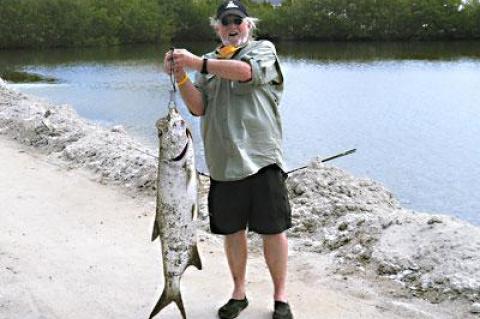 Fluke Hang in the Balance
Fluke Hang in the BalanceThe Ides of March, the days on and around March 15, were the start of the new year on the ancient Roman calendar. It was considered a propitious time full of promise unless you happened to be Julius Caesar, or the old men back in ancient Greece — long before Medicare — who were first dressed in animal skins, then beaten, and finally driven from town to celebrate the expulsion of the old year.
Who was it that said you can make naturalist into a scientist, but it’s almost impossible to teach a scientist to become a naturalist?
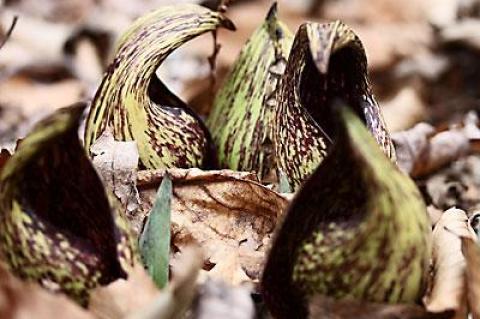 Nature Notes: Here Comes Spring
Nature Notes: Here Comes SpringOne more storm and then spring’s a-poppin’. In Noyac on Friday daffodils and daylilies began to sprout. Two weeks ago skunk cabbages were in bloom in Morton Wildlife Refuge in Noyac and at Big Reed Pond in Montauk. As of last Friday, deer ticks, both the blackish males and reddish-backed females, were crawling onto shoes, socks, and trousers in the shrub lands in Montauk east of the lake.
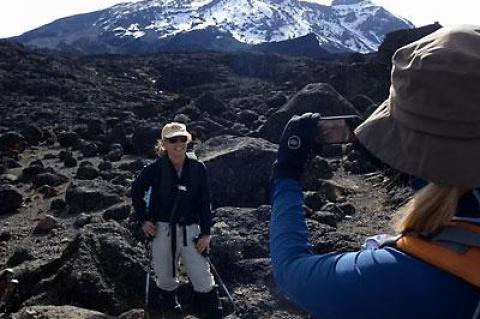 Kilimanjaro Celebration Was an Arduous One
Kilimanjaro Celebration Was an Arduous OneKarin Padden, who lives on one of Montauk’s high hills, said during a recent conversation that she had decided to climb Mount Kilimanjaro, “the world’s tallest free-standing mountain,” as a way of celebrating her 50th birthday.
It was also her way of saying that she, who has experienced much grief in the past several years, including the death of her husband, Robert M. Padden on Nov. 10, 2010, continues to love life and is not one to shrink from challenges.
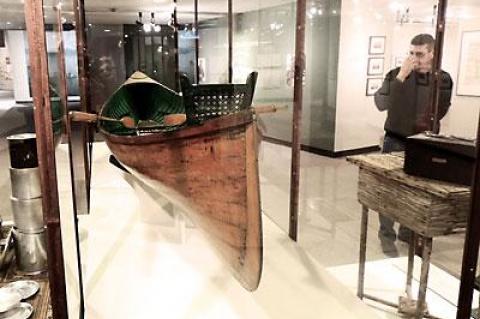 Nature Notes: To Albany and Back
Nature Notes: To Albany and BackLast Thursday, Karen Blumer, Vicki Bustamante, and I went north to Albany. After leaving Long Island it was bedrock all the way north along the Hudson River. The advance of the last ice sheet of the Wisconsin glaciation purportedly carved out the river basin that is over a mile wide in some places and stretches a good 200 miles. It is oriented north to south, so it makes sense that a quarter-mile-high glacier coming from Canada would be capable of making such a deep gouge and simultaneously creating the Palisades along the west side.
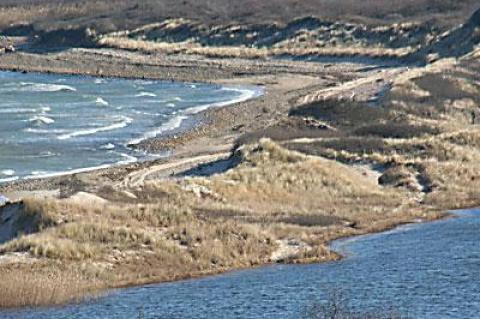 Nature Notes: Montauk Endures
Nature Notes: Montauk EnduresYou hardly hear anyone call it Lake Munchogue these days. The Hagstrom Suffolk County Atlas still has it down by its Native-American name, while including Oyster Pond in parentheses below. Many of the other water bodies on the South Fork retained names derived from the local dialects of the Algonkian language since settlement. There are Shinnecock, Noyac, and Mecox Bays as well as Lake Agawam, Poxabogue, Wickatuck, and Sagaponack Ponds and Sebonac Creek in Southampton Town. While in East Hampton there are Accabonac and Napeague Harbors and Napeague Bay.
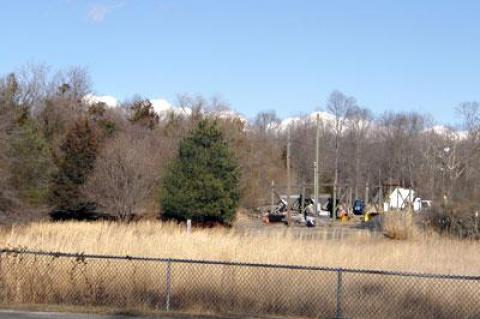 Nature Notes: Seeds of Change
Nature Notes: Seeds of ChangeMonday morning, the yard covered with a thick blanket of snow, but hints of global warming — six male robins and some starlings visited the privet and sniped the dark berries one by one. They were at it yesterday as well. The berries looked black, but when digested and defecated, they left deep purple stains in the snow. Privet berries must be emergency rations for berry-eating robins, which never feed on seed or suet.
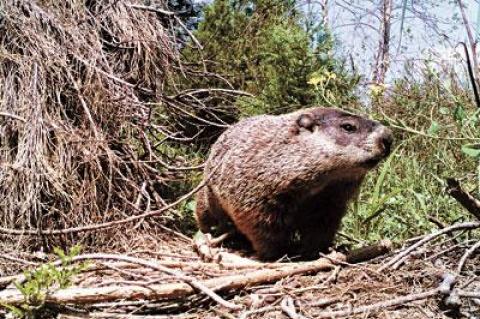 Nature Notes: If a Woodchuck Could Chuck
Nature Notes: If a Woodchuck Could ChuckPunxsutawney Phil in Pennsylvania and Staten Island Chuck didn’t see their shadows on Saturday while Malverne Mel and Holtsville Hal did. It’s hard to believe that Pennsylvanians and Staten Islanders will be blessed with an early spring, while we Long Islanders will suffer prolonged winter, as we are relatively close to those areas and prevailing climate conditions stretch for hundreds of miles. What weather conditions eastern Pennsylvania has, we should also enjoy.
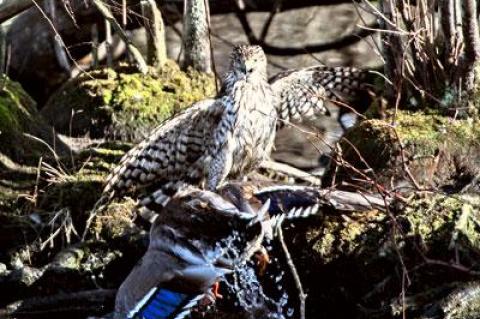 Nature Notes: Carolina in the Morning
Nature Notes: Carolina in the MorningIt was gently snowing with big and little flakes on Monday morning when I went into the living room with my coffee to see if Noyac Bay had frozen yet. I was greeted by a flutter as something whizzed past my head and ended up on top of one of the Venetian blinds where it twitched nervously. The twitching little body, white stripe over the eye, and cocked tail gave it away immediately — a Carolina wren. Poor thing, it didn’t like the freezing cold and falling snow any more than I did.
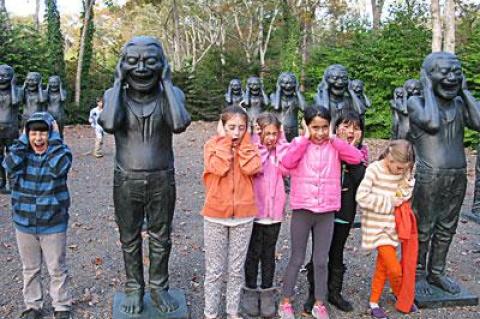 Nature Notes: Center Without a Home
Nature Notes: Center Without a HomeAcross the face of the world thousands of new organizations are spawned every day. Just take a look on the Internet and you will find millions of groups and associations that have an e-mail address ending in .org. It isn’t hard to start an organization, but it is hard to keep one going.
The two recent gang-rape incidents in India and the beheading of a Sri Lankan woman in Saudi Arabia, a so-called friendly nation, has caused me to wonder if we are making any progress at all. We are supposed to be culturally evolving and perhaps some of us are, but these atavistic acts by men makes me wonder.
Calcium. An element that we and billions and billions of organisms cannot live without. All vertebrates, with their vertebral columns and many other bones and teeth need calcium. All shelled mollusks and barnacles require calcium. You don’t find many barnacles, if any, in freshwater environments. Calcium is found in a host of other animals where it serves a variety of vital functions. Plants don’t metabolize calcium per se, but the calcium in lime or limestone neutralizes acid soils, which inhibits the growth of many plant species, including grasses, forbs, shrubs, and trees.
The last of the Long Island Christmas Bird Counts — the Orient Count — took place on Saturday. The count compiler over the last 20 years has been Mary Laura Lamont of Northville in Riverhead Town, and as of Sunday night all of the results had not been turned in to her. Nonetheless, after talking with Mary Laura, it is obvious that this was a very good count, especially for the North Fork territories and Shelter Island. Our part of the count was Cedar Point County Park on the east to Morton Wildlife Refuge on the west.
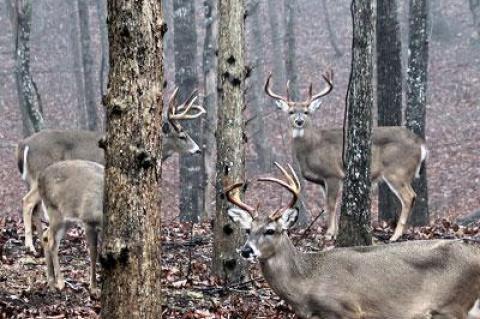 Nature Notes: Lessons From the Deer
Nature Notes: Lessons From the DeerThere’s a war on locally. I don’t mean the war on D.W.I.s or the war on drugs, I mean the war on the white-tailed deer, Odocoileus virginiana. It was here on Long Island before we were, even before the first Amerindians, and is the only member of the antlered-mammal family native to Long Island, we never had moose, elk, or caribou. Apparently, being too native is similar to being too alien. I once heard a well-known gourmet writer on North Haven call them “rats.”
Friday afternoon I was driving my pickup along Daniel’s Hole Road passing East Hampton Airport when three healthy looking female deer jumped the low fence on the edge of the airport side of the road and bounded across in front of me to the mowed field beyond. I saw them from a fairly long distance and slowed accordingly.
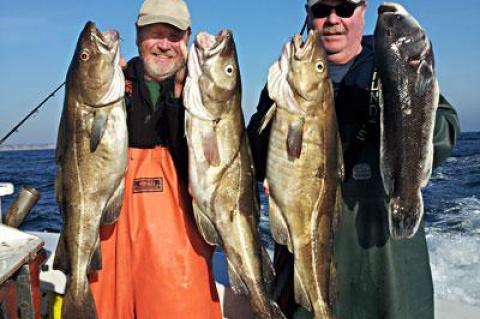 Blackfish: ‘Biting Like Ticks’
Blackfish: ‘Biting Like Ticks’With a week left before the close of the 2012 striped bass season for sport fishermen and with schools of herring schooling right outside the Montauk Harbor Inlet, things could be worse. Bass are still being caught, although the bite has slowed and the fish are smaller.
For boating anglers, what’s lacking in the striped bass department is being made up for in the bottom-feeding world of blackfish, a k a tautog from the Algonkian language.
We just learned something Monday as reported in both Newsday and The New York Times. The amount of carbon dioxide in the atmosphere continues to rise; it’s up 3 percent over last year. Every time we inhale, we 7 billion humans breathe in oxygen and exhale carbon dioxide. If that isn’t enough, all of the other billions and billions of organisms including both plants and animals with the exception of a very few, also respire, i.e., consume oxygen and discharge carbon dioxide.
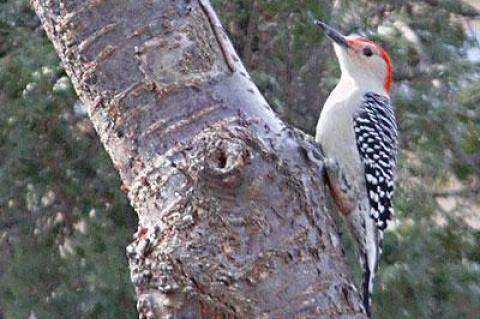 Nature Notes: Mixed Flocks
Nature Notes: Mixed FlocksOn Sunday at noon while sitting in the living room counting cars going by on Noyac Road, there was a sudden spate of bird activity swirling around the front yard. There were purple finches, red-breasted nuthatches, white-breasted nuthatches, chickadees, titmice, a downy woodpecker, and a Carolina wren. They hung around for about 10 minutes before picking up and heading west — all except the Carolina wren, which was not part of the group.
Two big storms in a row; will God try for three? As Bob Dylan recited so eloquently, “Something is happening, and you don’t know what it is, do you Mr. Jones?” It’s like that now in the world of geoclimatology and geopolitics. The two are meshing in a most confusing way, and while wasteful wars besmirch the earth, people by the thousands are dying for no good reason and sea level rises with no sign of abatement.
The Montauk SurfMasters fall tournament will come to an end at noon on Sunday. What promised to be an exciting finale, with plenty of big striped bass for the final weeks of the hard-fought contest, was curtailed by Hurricane Sandy. The big storm with her fierce easterly winds looks to have speeded migrating bass in the direction of their winter haunts and away form Montauk’s casters.
Live and learn, no matter how old. Reading Angus Wilson’s latest local bird-sighting blog, I just learned that there is a new species of Canada goose in town and it’s actually been here for a pretty long time, but it’s new to the East End in a couple of ways. Firstly, it was separated from Branta canadensis in 2004 by the American Ornithological Union and given its own scientific name, Branta hutchinsii, or Richardson’s cackling goose.
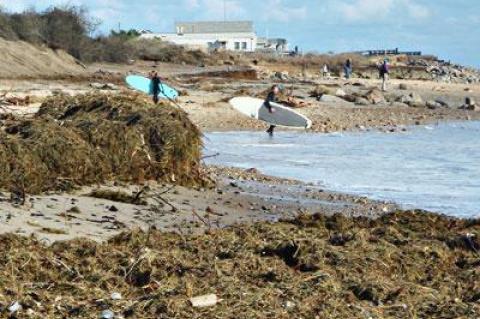 The Fish Are Winning
The Fish Are WinningWith summer prey species flung hither and yon by Hurricane Sandy and the subsequent northeaster, striped bass have been dining on crabs, at least that’s what dockside post mortems have been revealing.
The usual bottom-feeding crab eaters seem to be making up for whatever lost time occurred during the height of Sandy. Blackfish fishing has been productive in recent days. As for stripers in these waning weeks of the season, gannets have been seen diving presumably into schools of herring, high on the striped bass menu this time of year, a promising sign.
Capt. Fritz Hubner of Montauk said that before superstorm Sandy arrived he hauled the Captain Jay, the fishing boat he’s been running for the past 14 years. Experience has proved the better-safe-than-sorry adage many times over, he said in a recent interview.
The veteran charter captain who recently turned 80 said he had planned to hang it up 14 years ago, but a private boat owner liked his fishing experience and offered him the helm of his 43-foot Viking, the Captain Jay; he has been skippering ever since.
It’s Monday afternoon. This could be the Big One of which I spoke earlier. It’s pounding Noyac, and the best is yet to come. Noyac Bay is washing across Long Beach Road and marrying Sag Harbor Cove, it’s like the old days, before Suffolk County constructed Long Beach Road. Connecting Noyac with North Haven. I’ve been in this Noyac house since 1979 and have only seen those two water bodies meet up once before.
They say 70 percent of the earth’s surface is water. Astronomers and astrophysicists have conjectured that it comes primarily from comets (frozen water and dust) that struck the earth. One large comet carries a big cargo. If we were one of the cold planets, all this water would be ice. In a hotter climate, it would boil away and the atmosphere would be too hot and humid to sustain life, at least not human life.
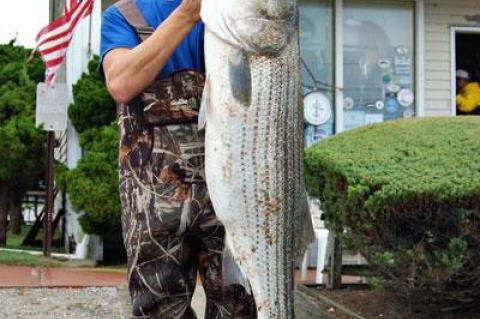 There’s Action Close to Shore
There’s Action Close to Shore“It’s Montauk,” was how Sue Jappell at Paulie’s Tackle shop in Montauk explained what happened to Robert Van Velsor on Friday.
Van Velsor was heaving a bucktail toward the horizon while standing in knee-deep water at Ditch Plain beach. He was at the end of a retrieve and was in the process of lifting the lure out of the water when a 42.46-pound striped bass snatched it. That’s the way to do it.
Nowadays, we hardly listen to our elders. Everybody wants to fast-track to the top, and young people speak a different language than us senior citizens. Everything is “cool,” but is it really? Before there was a host of school and post-school activities to attend and try to be good at, life was simple. It wasn’t easy, but it was simple. You worked hard and got along.
There were a few wise individuals who would be called prophets in the Biblical past; they proselytized to the rest of the community and tried to keep the train from leaving the track.
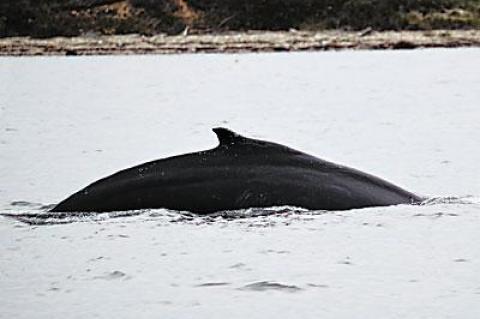 On the Water: Spoon-Trolling in a Sloop
On the Water: Spoon-Trolling in a SloopFishing under sail requires a great deal of forehandedness and attention to detail, disciplines not in evidence on Saturday when the sloop Leilani headed east out of Montauk Harbor bound for the fields of fish on the north side of Montauk Point and trolling a silver spoon.
Obviously, wind speed and direction are the first considerations. The state of the tide, which all fishermen know in order to decide on the most likely places to find hungry fish, takes on more importance under sail.
 Revenge of the Fish
Revenge of the FishDo you believe in fish revenge? Whales are not fish, of course, but Moby Dick is perhaps the best example of how, at sea, what goes around, comes around. If, like Ahab, you toy with fish to find meaning in life without the proper respect for the deep and its critters, you too will get yours.
A Moby Dick-like finale played out in front of dozens of surfcasters at Turtle Cove just west of the Montauk Point Lighthouse last Thursday.

